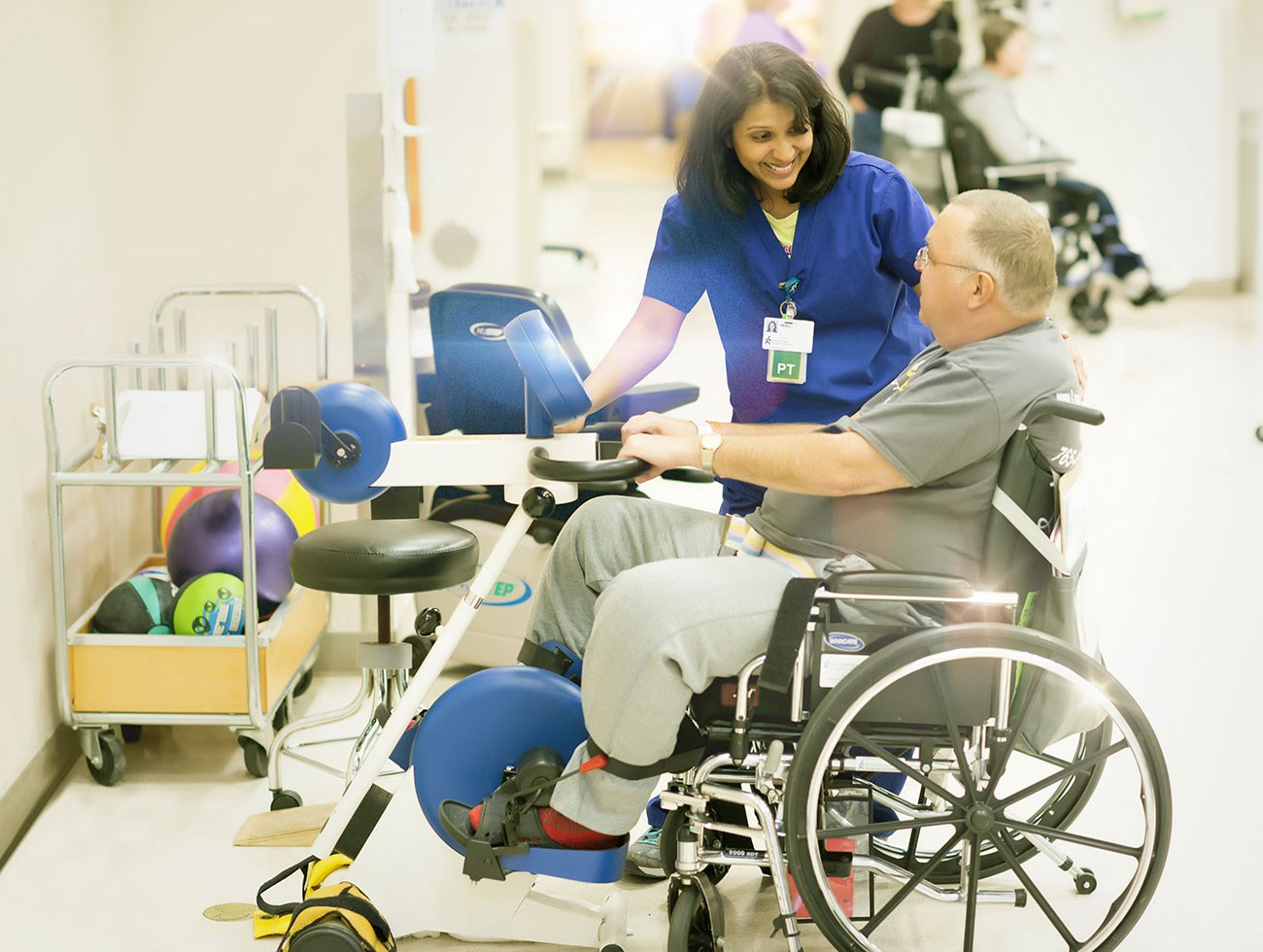
What to Expect in Acute Rehab
Inpatient Life from Admission to Discharge
Your First Day
When you arrive at Rehabilitation Hospital of Indiana (RHI) you will be taken to your room, where a member of your nursing team will help you get settled in and make you feel welcome. Your nurse will do a head-to-toe assessment and ask you questions about your history.
Depending on the time of day you are admitted, your attending physician might also visit you to continue the evaluation process. The physician will do a history and physical on you and will speak to you and your family about rehabilitation and answer any questions you may have on arrival. We ask that families and caregivers be present to help answer questions and help set goals for your treatment.
 Physical therapists work one-on-one with patients to focus on daily living activities.
Physical therapists work one-on-one with patients to focus on daily living activities.
Therapy Begins the Day After Admission
Therapy will begin the following day after admission. You will be evaluated by Physical Therapy (PT) and Occupational Therapy (OT) if ordered by your physician. You will also be evaluated by your Speech-Language Pathologist (SLP). You can expect 5 days of therapy for each week you that you are at RHI. Depending on what your physician and team recommend, you may have your therapy broken up over 7 days each week if you are still very weak and not able to tolerate the 3 hours each day spread over 5 days. Whether you get 5 days or 7 days, you will receive a minimum of 15 hours of therapy each week.
Therapy Regimen
Your therapy will be broken up into different sessions throughout the day. This allows you to relax and rest up for the sessions that will follow. Each therapy session you will be one-on-one with your therapist. We highly encourage you to have your family or caregiver present for training so that they can become familiar with your challenges and learn how to help you when you return home.
- Physical Therapy (PT) will work on walking, getting in and out of bed, standing up, sitting down, and walking up and down stairs, going out in the garden or on the walking path that surrounds the hospital.
- Occupational Therapy (OT) will focus on activities of daily living: bathing and grooming, dressing, eating and doing everyday tasks that are customary for you.
- If you receive Speech Therapy (SLP), they will work on memory and thinking skills. They will help with speaking and may help with your swallowing if you are having difficulty with eating a regular diet.
Sample Daily Routine and Expectations
Patients receive a minimum of three hours of individual one-to-one therapy, five days per week. Time not spent in therapies can be used to rest and visit.
6:00 - 8:30 am*: Wake up, get dressed, and eat breakfast
8:30 am -12:00 pm: Morning therapy sessions
12:00 - 1:00 pm: Lunch (in common area) and rest
1:00 - 5:00 pm: Afternoon therapy sessions
5:00 - 6:00 pm: Dinner (in common area)
6:00 - 9:00 pm: Relax and get ready for bed
*Occupational Therapy or Speech Therapy may work with you before or during breakfast, depending on your specific therapy needs
Working with an Interdisciplinary Team
During your time at RHI, you will be working together with an extraordinary team catered to your specific treatment. Your team may consist of several staff members collaborating to make sure your rehabilitation experience is the best it can be. Check out the list of staff that could make up your team:
The OT checks current abilities and develops a treatment plan for meeting goals in Activities of Daily Living (ADLs) including:
- Self-care, such as dressing and bathing
- Leisure, such as hobbies
- Work-related tasks
- Problem solving to accomplish any of the above
- Fine-motor skill development and strengthening, such as hand and arm exercises
- Vision
The PT checks current physical abilities and develops a treatment program for meeting goals in:
- Mobility needed for ADLs such as exercising muscles and joints, moving in bed, using a wheelchair, transferring (for example, from the wheelchair to the toilet)
- Walking with or without equipment
- Stairs
The SLP works on communication, cognition, and eating skills including:
- Listening, understanding and remembering what is heard in a conversation
- Thinking quickly and putting thoughts into words
- Sounding out words and explaining ideas
- Reading, understanding and remembering what is read
- Writing and putting thoughts into writing
- Cognitive skills needed to complete IADL’s (meds, finances, scheduling, etc) including problem solving, memory, attention, reasoning, mental flexibility
- If necessary, chewing and swallowing food since this involves the mouth and throat
The neuropsychologist tests for thinking abilities and provides help with:
- Understanding the links between brain injury, brain functioning and behavior
- Attention, memory, problem-solving skills, language skills and other areas of thinking
- Vocational recommendations
- Adjusting and coping with changes from a brain injury
The rehabilitation psychologist meets with patients, family and significant others to help with adjustment to hospitalization and disability. The psychologist collaborates with the rehabilitation team to support psychological and interpersonal functioning.
The Case Manager coordinates discharge plans and communicates with insurance or other payers about benefits. The Case Manager shares this information with the rehabilitation team to develop a plan that maximizes the rehabilitation stay. The Case Manager may have a background in either social work or nursing.
Doctors in the rehabilitation field who receive advanced training and certification in physical medicine and rehabilitation. Physiatrists are experts on how nerves, muscles, bones, and the brain work together. They look at the whole person, not just one symptom or condition.
Rehabilitation Nurses are very involved in teaching both patient and family about care needs and routines and have a variety of responsibilities:
- Monitor and oversee daily care
- Teach and help patients and families practice care routines
- Administer medication and teach patients and families about scheduled use and possible side effects
- Collaborate with other team members regarding rehabilitation goals and needs for community reentry
Getting Ready to Go Home
The treatment that you receive at RHI is intended to return you to your highest level of physical function while you are at RHI and as you progress home or to your next level of care. Treatment is also designed to teach you and your family/caregiver how to safely assist you in preparation for discharge. Your discharge back to home begins on your first day with us, so we strongly encourage family to be present and available throughout your stay so they can learn how best to assist you on your road to recovery.
- Your team will explain what equipment you may need when you go home. They will help prepare you and your family for any changes that may need to occur in the home to ensure that you are safe and able to be as independent as possible once you get there.
- You will have the opportunity to order your medicines that you need to go home with at our retail pharmacy located in the hospital lobby.
- Your follow-up visits with physicians and any followup therapy needed at discharge will be discussed with you before discharge. If you choose to continue your outpatient therapy with RHI, we are able to get those scheduled for you before you leave.
PATIENT TESTIMONIALAll of it has been meaningful. Everything they [the therapists] did was purposeful. It all had a function and a reason.
Rehabilitation Patient